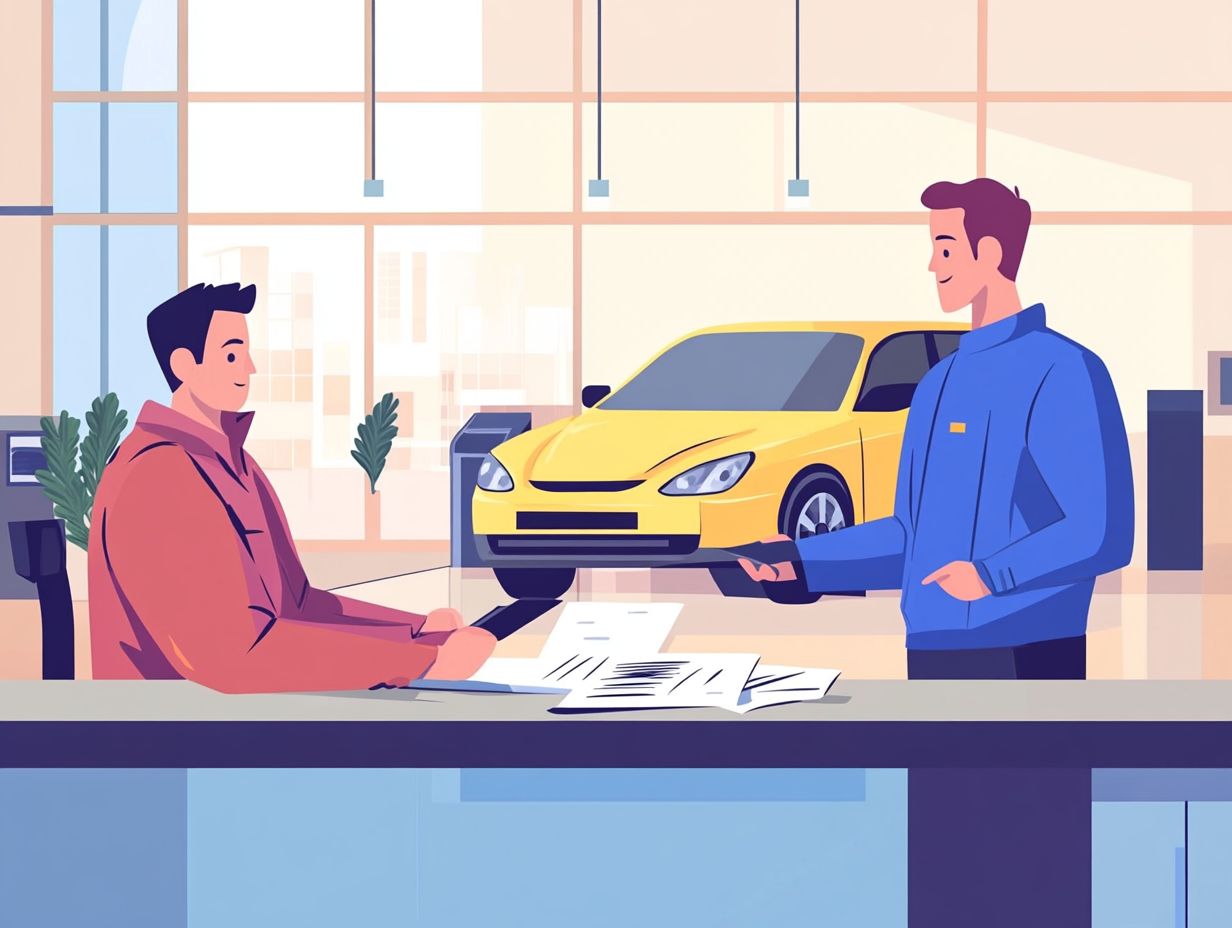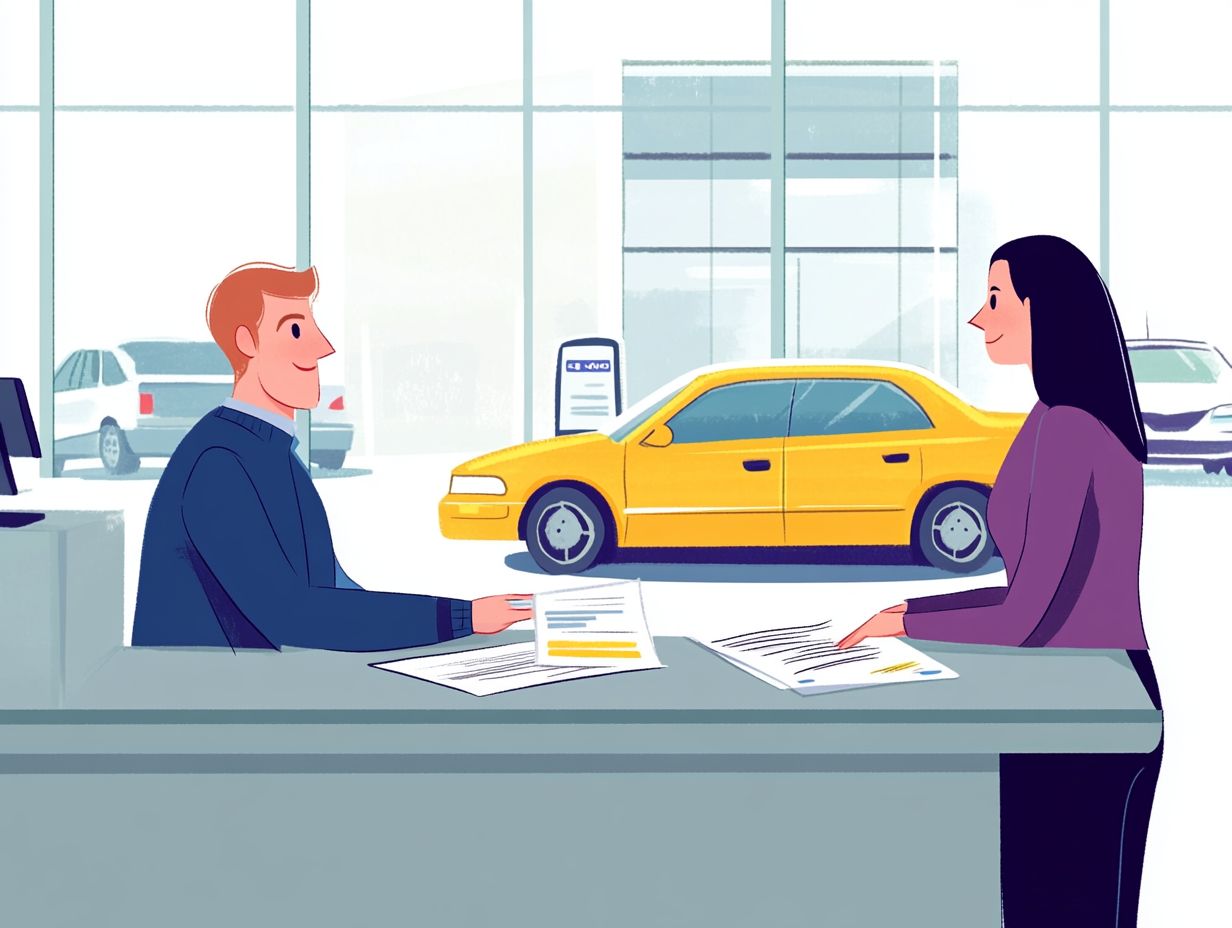How to Negotiate Your New Car Price
Purchasing a car can be both thrilling and overwhelming.
With numerous factors to contemplate from market research and pricing trends to mastering the art of negotiation it s crucial to tackle the process with assurance.
This guide will lead you through each stage, from your initial research to sealing the deal, ensuring you are thoroughly prepared to discover the perfect vehicle at the most favorable price.
Whether you re a first-time buyer or a seasoned pro, you ll uncover strategies that will elevate your car-buying experience.
Contents
Key Takeaways:

- Kickstart your negotiations with thorough research and knowledge of prices. This empowers you to negotiate confidently!
- Preparing for negotiations involves setting a budget and knowing your desired features. This will help you stay firm and focused during the negotiation process.
- Be strategic and confident in your negotiation techniques. Start with a lower offer and handle counteroffers effectively. Close the deal by finalizing the price and understanding the paperwork involved.
Understanding the Car Buying Process
Understanding the car buying process is essential. It helps you navigate the intricacies of purchasing a vehicle from a dealership.
Your journey starts with a clear assessment of your personal needs and preferences.
From there, delve into researching various financing options and evaluating the market value of your desired vehicle. Don t overlook the potential trade-in value of your current car; it can be a valuable asset in your negotiations.
This thorough preparation equips you with the leverage needed to secure the best possible deal without falling into the trap of overspending.
Staying informed about the Manufacturer s Suggested Retail Price (MSRP) the price suggested by the carmaker and any associated dealer fees is crucial, as these factors can significantly influence your final out-the-door price.
Steps to Buying a Car
The journey to buying a car requires a systematic approach to ensure you make informed decisions while keeping your budget at the forefront.
Start by gaining a clear understanding of your financial limits, allowing you to narrow down your choices with confidence.
This begins with a thorough assessment of your personal finances taking stock of your income and expenses to determine what you can comfortably allocate for a monthly car payment.
Next, dive into researching various makes and models. This knowledge will help you grasp market price ranges and identify fair pricing.
Once you have a handle on your preferences, explore financing options, including loans or leases. Compare interest rates and terms to secure the best deal that suits your needs.
Don’t overlook the importance of understanding trade-in value; it can significantly enhance your overall budget and streamline the car-buying experience.
Researching the Car Market
Researching the car market is a crucial step for you as a buyer to grasp the landscape of vehicle pricing and availability. This knowledge enables you to negotiate effectively and secure the best deal possible.
Factors that Affect Car Prices
Several factors influence car prices, including market value, dealership overhead costs, and the incentives available to customers.
In particular, external elements like supply and demand dynamics play a critical role, often causing prices to fluctuate based on the availability of vehicles compared to consumer interest.
Dealership fees, including hidden costs or add-ons, can significantly reshape the final purchase price. It s crucial for you to be aware of these potential additional expenses.
Economic conditions, such as interest rates and employment levels, also have a substantial impact on your purchasing power, which in turn affects the overall market value of vehicles.
By understanding these interconnected factors, you can gain valuable insights to enhance your car-buying experience.
Comparing Prices from Different Dealerships

Comparing prices from different dealerships is a savvy strategy that can significantly enhance your chances of securing the best deal when purchasing a vehicle.
This approach gives you a clear picture of the market value of your desired car. It also provides crucial information for negotiations.
By collecting multiple quotes, you can uncover price discrepancies that may stem from factors like dealership location or promotional offers. This research enables you to enter negotiations with confidence, fully aware of what constitutes a fair price.
Having several competitive quotes at your disposal can prompt dealerships to match or even beat their rivals’ prices, ultimately leading to impressive savings for you.
Preparing for Negotiations
Preparing for negotiations is essential for buyers aiming to secure the best possible deal on their car purchase. By developing a clear understanding of your budget and identifying your negotiating leverage, you can utilize tips for negotiating used car prices to position yourself to walk away satisfied and confident in your decision.
Setting a Budget
Setting a budget is the cornerstone of your car-buying journey, enabling you to navigate financing options with confidence. It s important to consider the total cost of ownership, which includes insurance, maintenance, and fuel, in addition to the purchase price.
A well-defined budget brings clarity to how much you can allocate for monthly car payments and what you can comfortably set aside for a down payment.
It s crucial to explore various financing options, such as loans from banks or credit unions, which frequently offer competitive rates. Opting for a cash payment can dramatically reduce the overall cost by eliminating interest charges, making it easier for you to remain within your budget.
Be mindful of the implications of sales tax, as this can add a significant amount to the final purchase price and influence your financial planning. By carefully considering these factors, you can make informed decisions that align seamlessly with your financial goals.
Knowing Your Desired Features
Knowing your desired features is essential when purchasing a car. It shapes your negotiation strategy and ensures you understand the vehicle’s market value.
By clearly identifying must-have attributes such as fuel efficiency, safety ratings, and advanced technology options, you can significantly bolster your position during discussions with dealers.
This clarity not only enables you to pinpoint the best offers but also enhances your confidence when evaluating trade-in values or financing terms.
Being well-versed in the advantages of specific features from infotainment systems to cutting-edge driver assistance technologies enables you to make astute decisions that align with both your personal needs and budget constraints.
When it s time to negotiate, this foundational knowledge becomes a powerful tool, helping you secure a deal that truly resonates with your lifestyle.
Negotiation Techniques
Let’s explore powerful tactics that will help you negotiate like a pro! Mastering negotiation techniques is essential in the car buying process. By honing your skills, you enable yourself to secure the best possible deal, including learning how to spot a good deal on a new car, through effective communication and strategic interactions.
Strategies for Lowering the Price

Implementing effective strategies to lower the price when buying a car can dramatically boost your chances to spot a good new car deal!
By entering the negotiation process with a well-thought-out plan, you can maximize your leverage. One effective strategy is to leverage cash payments since sellers often prefer immediate transactions over waiting for financing approval. This can encourage them to lower the price.
Prepare research on the vehicle’s market value. This preparation allows you to confidently discuss price adjustments and demonstrates your understanding of how to prepare for a new car purchase, showcasing your knowledge and authority throughout the negotiation.
Handling Counteroffers
Handling counteroffers is an essential part of the negotiation process, and it’s crucial for you to maintain leverage and respond strategically to dealer proposals.
To navigate this process easily, a blend of preparation and adaptability is key. Begin by clearly outlining your budget and preferred terms before you even step into negotiations; this lays a solid foundation for your discussions.
As you engage with the dealer, practice active listening. Their offers can provide valuable insights into what might be negotiable. Don’t underestimate the power of silence using silent pauses can encourage the other party to fill the void, often leading to the revelation of more information.
By staying composed and assertive, you can guide the negotiation in a direction that aligns with your best interests while keeping the dialogue open and constructive.
Closing the Deal
Closing the deal is the peak of your preparation and negotiation efforts, where everything comes together to finalize the price and terms of your car purchase. Now is your chance to ensure you secure the best deal available, reflecting the diligence you’ve put into the process.
Finalizing the Price and Terms
Finalizing the price and terms is a pivotal moment in your car buying journey, allowing you to solidify your deal and gain clarity on all dealer fees and potential cash back offers. This stage confirms the overall cost and reveals any hidden charges that could impact your final payment.
Make sure to examine the details carefully, including doc fees (the fees for processing your paperwork), destination charges, and any extra expenses that may sneak into the mix. By understanding these factors, you can more accurately assess the total expenditure and take advantage of any available incentives or promotions.
This thorough review helps you make informed decisions and possibly negotiate better terms, leading to a more satisfying purchase experience.
Understanding the Paperwork
Understanding the paperwork involved in purchasing a car is crucial for ensuring a seamless transaction and shielding yourself from hidden fees and unfavorable loan terms.
As a buyer, you’ll encounter a variety of documents, including financing agreements that lay out the loan terms, such as the yearly cost of your loan and repayment schedules. These financial details are paramount, as they can dramatically impact the overall cost of your vehicle over time.
Consumer protection agencies are your allies in this journey, playing an essential role in defending you against deceptive practices and ensuring you re fully informed about your rights and responsibilities. Engaging with these agencies can help reduce risks and provide a safety net as you navigate the intricate world of automobile financing.
Frequently Asked Questions

What is the best way to negotiate the price of a new car?
The best way to negotiate the price of a new car is to do your research beforehand. Look up the average market price for the specific make and model you want, as well as any current promotions or incentives being offered by the manufacturer. Utilizing negotiating tips for buying a new car will give you a better idea of what a fair price would be and provide you with more leverage during negotiations.
Should I negotiate the price of a new car in person or through email/phone?
It is recommended to negotiate the price of a new car in person. This allows for a more personal and direct interaction with the salesperson, making it easier to convey your points and negotiate effectively. However, if you are unable to negotiate in person, email or phone negotiations can still be effective if done properly.
Is it okay to negotiate the price of a new car even if it’s already on sale?
Yes, it is always okay to negotiate the price of a new car, even if it is already on sale. Often, sales and promotions are used as a starting point for negotiations. To get the best outcome, consider learning how to prepare for a car purchase negotiation. Don’t be afraid to ask for a better deal or additional discounts, as the worst they can say is no.
Ready to negotiate your best deal? Get started today!
What should I do if the salesperson refuses to negotiate the price of a new car?
If the salesperson refuses to negotiate, it might mean that the dealership isn t willing to lower the price. You can try negotiating other parts of the deal, like trade-in value or financing terms. If that doesn t work, don t hesitate to walk away! There are better deals out there waiting for you.
When is the best time to negotiate the price of a new car?
The best time to negotiate is at the end of the month or year. Dealerships often have sales quotas to meet, so they might be more willing to negotiate to make a sale. Shopping during slower months also increases your chances of a better deal.
Is it necessary to negotiate the price of a new car if I am leasing instead of buying?
Yes, you should still negotiate the price if leasing. The monthly lease payment is based on the negotiated price, so a lower price means a lower monthly payment. It can also help reduce any upfront fees or down payments.






